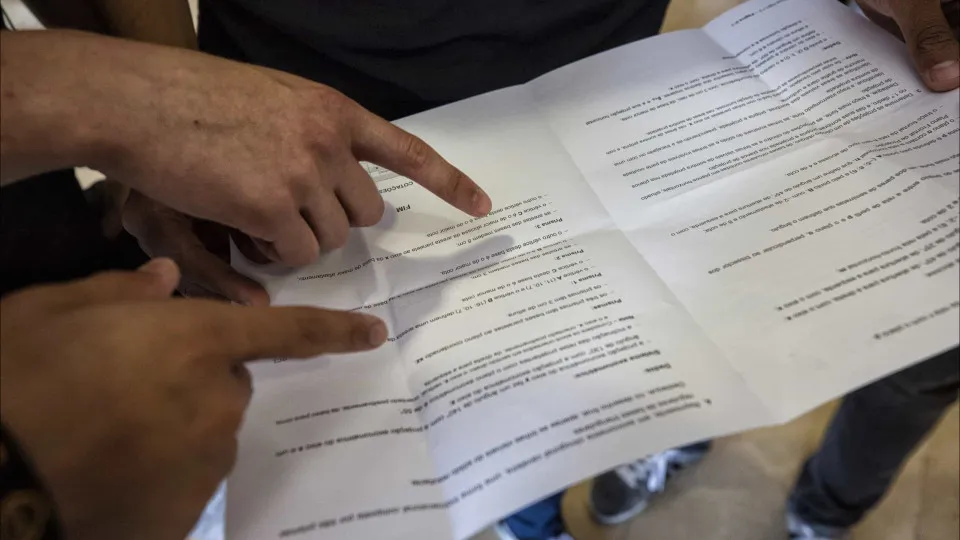
The production ‘Agora É que São Elas’ is set to premiere on September 19 in Lisbon, starring Maria Clara Gueiros, Priscilla Castelo Branco, and Júlia Rabello. With sketches penned by Fábio Porchat, this trio of comedians brings an array of characters—even supernatural beings—to showcase the “absurdity” of everyday situations.
Notícias ao Minuto engaged in a discussion with the three actresses and the playwright himself. During ongoing rehearsals, the comedians reflected on how this play is a collaborative creation, with Porchat’s trust in them and the enjoyable process of working together.
“We live in such crazy times and have so much to do that we sometimes don’t pause to see the absurdity of things,” a line from the play suggests.
For those who know nothing about the play: What should they expect?
Priscilla [P]: I think the play speaks a lot about everyday situations, people, personalities… about the exaggeration of traits and situations we live absurdly but with which we can identify.
Maria Clara Gueiros [MC]: These are situations everyone will relate to, real everyday scenarios: someone who hasn’t seen a friend in a long time, and upon meeting them again, the friend has turned into a misguided mystic. A mother discusses sex with her daughter and finds out the daughter knows more than she does. Situations start typically and escalate to the extreme. The humor lies in that.
Júlia Rabello [J]: It’s a magnification of these situations we live: we start realizing the absurdity of the situations.
MC: Indeed. It returns us to our perception of absurdity.
So the play is a way to put situations into perspective and unite people? How sometimes there are situations we think only we are experiencing. Does this identification mentioned play a part in the show?
JR: Laughing at ourselves is a wonderful path. We live in such crazy times, everything moving so fast, that we sometimes don’t stop to see the absurdity of things. When we do stop, look and see it on stage… we laugh at it. That’s wonderful. I think it gives the system a ‘restart.’
P: Comedy certainly has that unifying power. When one laughs, it prompts another, right? Besides the piece fostering this unity of identification [with situations], I think laughter brings this unity of people laughing together, at that moment.
Is laughter really the best medicine?
P: Absolutely.
MC: Additionally, the fact that these are scenes everyone can relate to, in some way—either a person identifies themselves or knows someone—opens a door for communication with the audience. As the script is very funny, it’s a recipe for success.
JR: And all this that we talk about, laughing at ourselves, is through Porchat’s pen, who has a manner of speaking that people resonate with. He already has this [Fábio] Porchat universe—it’s a very enjoyable ride.
“Improvisation is always a resource. I recommend it for life,” the ensemble advises.
Júlia has worked with Fábio, notably in ‘Porta dos Fundos’, but what about Priscila and Maria Clara? Is this the first time collaborating?
MC: Yes, in theater. I’ve done a bit here and there with Fábio throughout our long careers. It’s a truly effective partnership. In theater, this is the first time—and, wow, it’s delightful.
P: In theater, it’s the first time too, but I have recorded sketches with him before. Not the first time working together, but the first in theater.
And how did it go this time?
P: I’ll speak for us because we’ve talked about this a lot. We have a lot of confidence in Fábio’s humor and perspective. He is quite demanding, yet simultaneously very open to what we bring. The rehearsals were swift; we had little time to rehearse but were very satisfied with the outcome.
F: I was quite confident—even before the rehearsals started. I knew I had three very good, funny comedians. I was very happy when I saw in the reading just how much they were already enhancing the text. It’s excellent when comedians take your script and make it better, funnier than I had imagined. That’s what happened. Even when writing, my ear was already tuned to them. I know all three, worked extensively with Júlia at ‘Porta dos Fundos’, knew Priscila’s speaking style, and had an idea of how Maria Clara and Júlia would act. So when they joined the rehearsals fully, it was wonderful as I could see the text truly come to life before me. It became very entertaining.
Is there room for improvisation too? Do you have any career moments where it went wrong? And do you consider improvisation integral for a comedian?
J: Improvisation is the language in which one must be fully literate in comedy, right? Comedy demands quick thinking, the agility to seize that moment, that thought, and transform it into something humorous. I love comedy that tickles the intellect. I adore it. I think improvisation achieves a lot of that. I think it’s very important for those wanting to work with humor to feel comfortable with this element. I think it’s a dangerous, delightful element, and that’s where some of the most interesting things emerge—and we even surprise ourselves. From the start, we have a script from Fábio with a very strong signature. By following just the text’s logic, one will perform comedy. Yet, besides this, there’s the fun of embodying the script—and the stimulation Fábio provides to improvise. We brought things, and interestingly, many of them stayed in the production. In no time, we will perform a Shakespeare… just kidding [laughs].
MC: What’s essential is knowing—and every comedian knows—that improvisation is a garnish. It’s like salt. One mustn’t overuse it and stay tuned [alert] and regulated—first by oneself, to not say whatever comes to mind, as the error probability is significant. Being on stage, the three of us have a rapport and trust among each other, allowing for the occasional ‘that didn’t work’ to be said naturally. Some things work for a while. Since theater is very much alive, some jokes age, their relevance dwindles in the broader context. We need to stay attuned.
P: Sometimes things happen in the moment where minimal improvisation allows overcoming adversity. Now, speaking personally: My life is an improvisation. I’m challenged by routines and organization. So I improvise daily with my personal matters. Improvisation is always a resource. I recommend it for life. If something in your routine fails, having the ability to improvise allows it to flow.
Fábio Porchat [F]: But there’s something critical, and within rehearsals, I was very attentive to what they brought new. What worked. The director’s outside perspective was crucial. I had to decipher what amused just us and what would entertain the audience, what enriched the scene, or what was tossed aside. One improvised line, two, even ten can be funny, [but] when everything becomes improvisation, the scene doesn’t progress. Therefore, there’s a limit. Indeed, at times, I think ‘this slightly contradicts the scene’s message, going in a different direction.’ During rehearsals, I closely observed what they contributed, as sometimes the text needs things I can’t see, which they can as performers. That was immensely significant during rehearsals. And, naturally, during the play, the director isn’t present, and they devise countless things. Occasionally, though, I drop by unexpectedly, just to keep them on their toes [laughs].
MC: Sometimes he asks, like this past weekend [in May], for a session to be recorded, and we still don’t know which one will be.
How so?
F: I’m busy with my show, preventing me from seeing all the rehearsals. Since they are on stage, I ask the production to record the play to discuss the scene and give feedback on its execution.
You also portray three male characters during the show. What is the biggest challenge, if there is one, in playing a man?
P: Gender isn’t that crucial in our play’s situations. It’s just to indicate it can happen to anyone. It isn’t necessarily a woman’s thing or a man’s. The scene with the optimist, for instance, features two men, and it’s about someone with an irritating optimism…
That ‘toxic positivity’?
P: Exactly. There’s no explicit need. It’s not an issue. The challenge is like in sketches: embodying it, giving life to that character.
MC: But everything is already in the script. I always say this. Performing as written is already advantageous. Because the script is very well written, we certainly need to tweak it here and there, but the script already conveys everything.
J: I think there’s just one scene, the couple’s, involving sex, that plays a bit with gender roles, because, generally, there’s this ‘flavor’: being men, women. We even have supernatural beings.
“They have taken the texts as their own and perform it with such naturalness. I can enjoy myself. It isn’t stressful for me. I even forget it’s my text,” Porchat acknowledges.
About the story’s topic, since it contains multiple tales, is there any story or character presently more vital or urgent? Or is everything significant?
P: Everything is significant, though I’d say a major connection is with those familiar with people who pray to all saints, who recite various prayers, and immediately inquire about your sign—yet also know your saint and the related prayer. Today, we all know someone deeply into astrology, knowing your sign, color, and stone. This identification exists. Today’s portrayal of this scene with a mother and teenage daughter, discussing sex and internet-acquired knowledge, is very resonant. The Embarrassment Angel too, when you ‘misspeak,’ and this angel comments: ‘Well…’. Or Wonder Woman—a reflection of today’s exhausted women, suggesting even Wonder Woman might be tired—this resonates too.
MC: Every bit has significant relevance.
P: The scene with the mother and adolescent daughter is quite interesting, depicting a society where parents aren’t connected with their children, perceiving them as naive. Yet, on the internet, children access things even parents are unaware of. Ultimately, it mirrors this perspective. There’s another scene portraying a father and mother with a baby. It depicts society’s anxiety about wanting the child to talk, walk, be special, to sing the national anthem at six months. It conveys the parent’s anxiety, not allowing the child to be a child, not allowing time for growth. An anxiety over ‘Oh my God, will my child talk?’ Relax, they will in time. This encapsulation of time, haste, generational themes permeates the play.
We know Fábio doesn’t take the stage, but as the playwright, if you had to choose: write indefinitely or perform?
I’d choose performing. I love being on stage, experiencing live audience reactions, seeing them laugh live. It’s the best feeling in the world. It’s what I know how to do, what I’m meant for. I love writing, and it’s among the most powerful things out there, but acting is innate. I love it.
But generally, watching your script performed by others is nerve-wracking for a director. Yet here, I’m entirely at ease. I still laugh. They’ve owned it. They’ve embraced the texts, performing with utmost comfort and authenticity. I genuinely enjoy myself. I tend to forget the texts are mine.
We spoke about a year ago, regarding the return of ‘Histórias do Porchat’ to Portugal. Was the return successful?
It was great. The Portuguese audience welcomes me warmly. I genuinely feel at home. I’m thrilled that 80% of my show’s audience are Portuguese. Many Brazilians come too, of course, but a significant number of Portuguese attend. I eagerly await seeing these fans who enjoy my work and find joy in my performances also going to see the girls, to laugh with them. The scripts are mine, I direct, but they are incredibly powerful.
Ultimately, it’s to laugh, to connect. Regardless of whether you live in Brazil or Portugal, these situations will resonate, and you will laugh. As Júlia often says, you either are someone or know someone who is like that. Ultimately, the audience seeks to spend an hour laughing, then leave to enjoy some food. In Portugal, they indulge in even tastier delights, but in the end, it’s about that.




